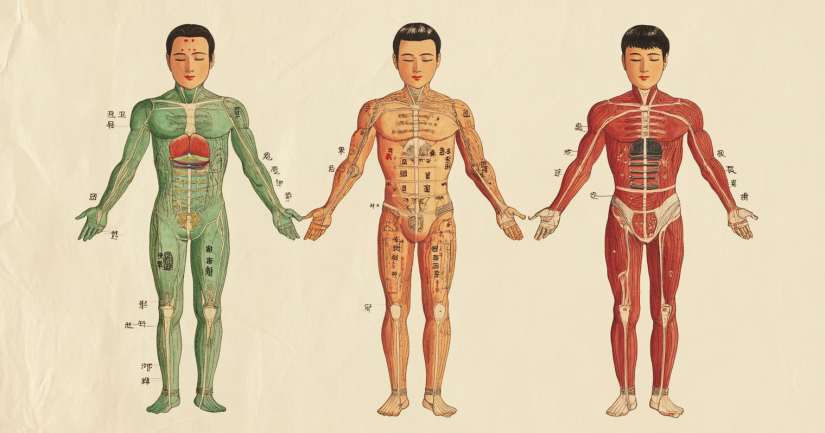
Discover your unique body type and unlock the secrets of Chinese medicine with our engaging Chinese Medicine Body Types Quiz, Discover Your Traditional Chinese Medicine Constitution. The Chinese Medicine Body Types Quiz helps you understand your unique constitution based on Traditional Chinese Medicine (TCM). TCM categorizes the body into different types, each with specific characteristics, strengths, and imbalances. These body types influence health, digestion, energy levels, and emotional tendencies. By identifying your type, you can learn how to restore balance and improve well-being through diet, lifestyle, and herbal remedies.
In Traditional Chinese Medicine (中医, Zhōngyī), Yin and Yang represent the balance of opposing forces in the body. Yin is associated with coolness, moisture, and stillness, while Yang symbolizes heat, dryness, and activity. A healthy body maintains harmony between these two forces. When one dominates, it creates imbalances that lead to health issues. TCM body types are categorized based on Yin-Yang balance, Qi (vital energy), Blood, and body fluids.
Curious about how medicine connects to individuality? Dive into ancient philosophies with the Traditional Chinese Medicine Quiz, or explore holistic approaches in the Chinese Medicine Quiz. Once you’ve finished this adventure why not head over to What Font Am I Quiz for a offbeat twist. You’ll daydreaming as you compare your results and maybe see how offbeat life can be. Then saunter over to What Chinese Food Should I Order Quiz to see how your answers stack up.
Now’s Your Turn – Chinese Medicine Body Types Quiz
The Concept of Yin and Yang in Chinese Medicine
The Nine Traditional Chinese Medicine Body Types
TCM classifies people into nine different body constitutions, each with unique traits:
- Balanced Type (平和体质, Pínghé Tǐzhì) – The ideal state with good immunity, stable emotions, and strong digestion. People with this type enjoy robust health and adaptability.
- Qi-Deficient Type (气虚体质, Qìxū Tǐzhì) – Low energy, weak immunity, and shortness of breath. These individuals benefit from warm foods, ginseng, and energy-boosting practices.
- Yang-Deficient Type (阳虚体质, Yángxū Tǐzhì) – Prone to cold intolerance, sluggish digestion, and fatigue. Warming foods like ginger, cinnamon, and lamb help restore balance.
- Yin-Deficient Type (阴虚体质, Yīnxū Tǐzhì) – Often experiences dry skin, night sweats, and restlessness. Cooling foods like pears, goji berries, and herbal teas are recommended.
- Phlegm-Dampness Type (痰湿体质, Tánshī Tǐzhì) – Prone to weight gain, bloating, and sluggish metabolism. Light, detoxifying foods like green tea, radish, and barley improve balance.
- Damp-Heat Type (湿热体质, Shīrè Tǐzhì) – Prone to acne, inflammation, and excessive sweating. Bitter foods like bitter melon, mung beans, and chrysanthemum tea help reduce internal heat.
- Blood-Stasis Type (血瘀体质, Xuèyū Tǐzhì) – Cold extremities, dark under-eye circles, and poor circulation. Blood-moving foods like turmeric, black fungus, and hawthorn are beneficial.
- Qi-Stagnation Type (气郁体质, Qìyù Tǐzhì) – Prone to stress, irritability, and mood swings. Aromatic foods like tangerine peel, basil, and rose tea help regulate Qi flow.
- Special Constitution Type (特禀体质, Tèbǐng Tǐzhì) – Sensitive to allergens, prone to asthma or skin conditions. Herbal therapy and a carefully planned diet improve resilience.
How Traditional Chinese Medicine Restores Balance
TCM emphasizes personalized health based on your constitution. Healing methods include:
- Dietary therapy (食疗, Shíliáo): Adjusting food choices to match body type and seasonal needs.
- Herbal medicine (中草药, Zhōngcǎoyào): Using plants like ginseng, astragalus, and goji berries to restore Qi and Blood balance.
- Acupuncture (针灸, Zhēnjiǔ): Stimulating energy pathways to improve circulation and organ function.
- Tai Chi and Qigong (太极 & 气功): Gentle movements that enhance Qi flow and strengthen the body.
How Well Do You Know Your TCM Body Type?
Understanding your body type helps you maintain better health, energy, and emotional balance. Whether you experience Qi stagnation, Yin deficiency, or Yang excess, Traditional Chinese Medicine offers natural ways to restore harmony. Take the Chinese Medicine Body Types Quiz to find out which type matches your constitution and discover the best ways to improve your well-being!
China Quizzes – Explore the Wonders …
